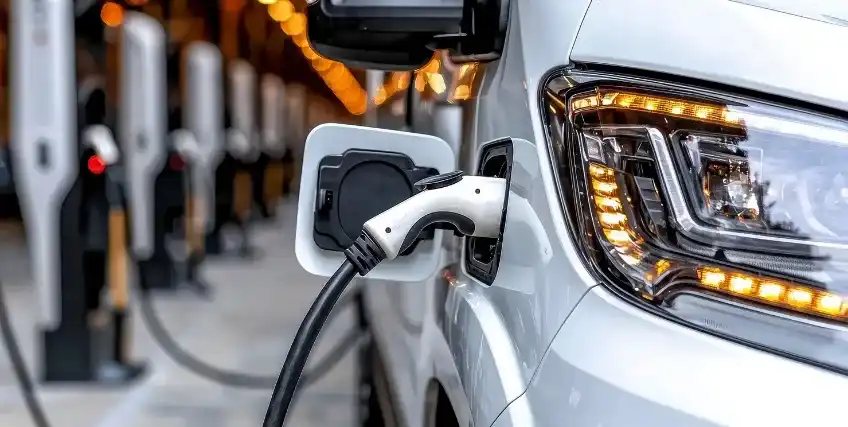Challenges and Opportunities for Small Businesses Switching to Electric Commercial Vehicles
August 22, 2025 | Last Updated on: August 22, 2025

Electric vehicles aren't just for tech giants or government fleets anymore. Across America, small businesses are exploring electric vans, trucks, and other commercial vehicles to cut fuel costs, improve sustainability, and even boost their brand image. But the transition isn't always simple.
Electric vehicles often cost more upfront than traditional gas-powered options. For many business owners, that's a tough pill to swallow, especially when they already juggle tight cash flow. And while long-term savings in fuel and maintenance look attractive, the initial leap can feel risky.
This is where commercial auto financing steps in. Instead of draining capital reserves, financing allows small businesses to spread those high purchase costs into manageable monthly payments. With the right mix of competitive rates and flexible terms, financing can turn an expensive dream into a practical step forward.
Some even consider pairing business auto loan financing with government incentives or grants, creating a hybrid approach that reduces strain while building long-term fleet sustainability. At the same time, loan application processes, eligibility, and varying interest rates often leave borrowers feeling overwhelmed.
The EV shift is here, and it's not slowing down. The question isn't if small businesses will adapt, but how they'll make the numbers work and commercial auto financing is shaping up to be the key that unlocks the door.
The Tough Financing Reality of Electric Commercial Vehicles
Switching to electric commercial vehicles isn't just about swapping out engines. For most small businesses, the financing part is where the real headache starts.
First up: higher upfront costs. Electric trucks and vans can be more expensive than similar gas-powered models. Add to that the cost of charging infrastructure, and suddenly the loan amount feels a lot bigger than expected. For a borrower already balancing payroll, supplies, and rent, those extra zeros can be intimidating.
Then comes the issue of commercial auto loan rates. Since electric vehicles are relatively new in the market, some lenders aren't sure how to price the risk. The uncertain resale value of EVs, tied to battery life and technology changes, makes things even trickier. This can lead to tighter eligibility requirements, higher interest rates, or even limited approval options.
Another challenge is cash flow pressure. For a small delivery company or contractor, committing to larger monthly payments without a clear sense of long-term savings can feel like a gamble. And unlike buying a used vehicle, there's less wiggle room in negotiations since EVs are still in short supply.
In short, while the benefits of going electric are clear, the financing puzzle is not. That's why commercial auto financing becomes more than just a tool; it's the bridge that lets business owners take the leap without putting their operations at risk.
Why Commercial Auto Financing Holds the Key to EV Adoption
For many business owners, the decision to invest in electric fleets isn't about desire—it's about dollars. EVs promise lower fuel and maintenance costs over time, but the sticker price is still a barrier. That's exactly where commercial auto financing comes into play.
Instead of tying up valuable capital, financing breaks down the cost into steady monthly payments. This makes it easier for a small business to predict expenses and manage cash flow without derailing other priorities like payroll or inventory. In fact, some credit unions and fintech platforms now offer vehicle financing products designed specifically for eco-friendly fleets, often with competitive rates and flexible terms.
Another big plus is accessibility. With business auto loan financing, companies can tap into funding for both new and used vehicles, making the switch less daunting. The financing process also opens doors for tailored financing options, like longer repayment terms or a mix of fixed-rate and variable payment structures depending on the borrower's credit score and business needs.
And there's paperwork, like loan applications, disclosures, eligibility checks, credit approval. But when done right, financing can shift EVs from “someday” purchases to real assets on the lot today. Simply put, without commercial auto financing, most small businesses would find it nearly impossible to make the EV transition at scale.
Government Incentives and Grants
For small businesses, the steep upfront price of EVs can feel out of reach. But government incentives and grants often step in to tip the scales. These programs reduce loan amounts, ease monthly costs, and make commercial auto financing far more manageable.
State and Local Grants: Adding an Extra Boost
Programs like California's Hybrid and Zero-Emission Truck and Bus Voucher Incentive Project (HVIP) provide upfront discounts for qualifying fleets. These local subsidies can layer on top of federal credits, dramatically lowering monthly payments for small businesses. When combined with commercial auto financing, the result is a more achievable transition, particularly for smaller delivery firms or contractors struggling with tight cash flow.
Paperwork, Approvals, and Real Barriers
Incentives sound great, but the fine print matters. Applications require detailed disclosures, strict credit approval, and sometimes even an NMLS-registered lender partnership. The process can frustrate business owners, especially if they lack time or dedicated financial staff. Still, when grants line up with commercial auto financing, the savings can outweigh the red tape, making EV adoption less of a gamble and more of a strategy.
Green Loan Programs and Sustainable Financing Models
Not every small business wants to wait for government grants. Some are leaning on banks, fintech firms, and even credit unions offering specialized “green fleet” products. These financing options are designed for companies eager to electrify without draining working capital.
One major advantage is the structure. Many institutions now bundle commercial auto financing with perks like extended repayment schedules, flexible terms, and in some cases, lower interest rates. For a business juggling cash flow concerns, locking in predictable monthly payments makes the transition less intimidating. Certain programs even waive early repayment penalties, giving the borrower added breathing room.
Another big development is competitive rates for EV-focused loans. Platforms that specialize in business financing often promote products marketed as “sustainable” or “green.”
Innovative models are also emerging. Some dealerships and fintech players experiment with mileage-based repayment, essentially adjusting payment options based on vehicle use. Others structure financing alongside equipment loans, allowing businesses to cover EVs and charging infrastructure in a single package. These unique setups give business owners more control over cash allocation.
For companies willing to explore, commercial auto financing tailored to EVs could be their smartest long-term investment.
Commercial Auto Loan Refinance: Making the Switch Easier
For many small businesses, the jump to EVs doesn't always mean starting from scratch. Some are turning to commercial auto loan refinance as a way to ease into the transition. Instead of piling new debt on top of old, refinancing allows them to restructure existing obligations and free up capital for electric fleet purchases.
Businesses holding older commercial vehicle loans can refinance into updated terms that feature lower interest rates or extended repayment options. In practice, this often reduces monthly payments and improves cash flow, leaving more room in the budget for charging stations, warranties, or other essential costs. Even if the savings look modest, the ripple effect across a year can be significant.
Some credit unions and fintech providers even offer refinance products tailored for business vehicle upgrades, particularly when shifting toward sustainable fleets. They highlight competitive rates, fixed-rate stability, and in some cases, incentives for green adoption. By combining refinancing with commercial auto financing for new EVs, business owners can create a blended strategy – one that balances risk with opportunity.
Of course, as with any loan application, eligibility and credit score remain key factors. But for businesses with decent credit, a refinance may provide the breathing space needed to join the EV shift without overstretching finances.
The Best Commercial Auto Loans for EV Fleets
Choosing the right financing partner is almost as important as choosing the vehicle itself. With EVs still relatively new in the commercial vehicle market, not every product fits the unique needs of small businesses. That's why evaluating the best commercial auto loans is a step business owners can't afford to skip.
Traditional banks may offer stability, but their loan applications often involve strict credit approval processes, lengthy disclosures, and tougher requirements tied to personal credit. Meanwhile, credit unions sometimes extend lower interest rates and more flexible terms to their members, though eligibility can be limited.
On the other hand, fintech platforms and dealerships often promote competitive rates with quicker credit decisions. Some even bundle business auto loan financing with perks like extended warranty coverage or combined packages that include equipment loans. For borrowers looking to upgrade both vehicles and charging infrastructure, this all-in-one approach can simplify the process.
The best strategy is to compare providers. Look beyond the headline annual percentage rate to weigh payment options, total loan amount, and how each product aligns with your business needs. By pairing grants or incentives with tailored commercial auto financing, business owners can secure EV fleets without sacrificing long-term stability.
Key Considerations Before Going Electric
Switching to EVs isn't just about buying shiny new vans. For small businesses, the decision requires looking at the bigger picture and making sure the numbers truly work.
First, there's the issue of charging infrastructure. Installing stations at a warehouse or office can add thousands to the upfront cost, on top of the vehicle purchase itself. That's where planning ahead with commercial auto financing or even a bundled equipment loan makes sense. By rolling chargers and vehicles into one loan application, companies can manage the transition under a single set of monthly payments.
Maintenance is another factor. EVs often have fewer moving parts, but battery replacement costs can be steep. While warranties help, business owners should budget for future expenses and check how different financing options cover used vehicles or long-term warranty protection.
Then comes the financing landscape itself. Commercial auto loan rates may shift as lenders gain more data on EVs, but for now they can vary widely between banks, credit unions, and dealerships. A smart borrower weighs the total loan amount, interest rates, and payment options rather than chasing the lowest teaser rate.
Going electric isn't only about sustainability, it's about strategy. With thoughtful planning, and the right mix of incentives and commercial auto financing, EV adoption can strengthen both operations and long-term business financing goals.
Conclusion
The shift to electric fleets isn't a passing trend. It's quickly becoming the new standard for small businesses that rely on commercial vehicles every day. Yet the biggest roadblock continues to be cost. From higher sticker prices to infrastructure needs, making the leap requires more than good intentions. It requires smart money moves.
That's where commercial auto financing steps up. By spreading big-ticket purchases into structured monthly payments, it allows business owners to protect cash reserves while upgrading fleets. Pairing this with grants, tax credits, or even commercial auto loan refinance options creates a path that's both affordable and sustainable.
There are challenges, like uncertain resale values, shifting interest rates, and eligibility hurdles. But when the right mix of incentives and the best commercial auto loans align with careful planning, EV adoption becomes less of a gamble and more of a growth strategy.
At the end of the day, financing isn't just about getting vehicles on the road. It's about creating the breathing room businesses need to stay competitive, reduce costs, and prepare for a greener future. For many, commercial auto financing is no longer optional. It's the key to driving forward.
FAQs About Commerical Auto Financing
What is the role of commercial auto financing in switching to electric vehicles?
Commercial auto financing helps small businesses cover the high upfront cost of electric commercial vehicles. Instead of paying everything upfront, owners can spread expenses into manageable monthly payments, easing cash flow pressures.
How do commercial auto loan rates differ for EVs compared to gas vehicles?
Commercial auto loan rates for EVs vary more because lenders are still gauging long-term resale values and battery performance. Some credit unions and fintechs offer competitive rates to encourage green adoption.
Can commercial auto loan refinance be used for electric vehicle purchases?
A commercial auto loan refinance lets businesses restructure older vehicle financing into better terms, freeing capital for EVs. This lowers interest rates or extends repayment for improved cash flow.
What are some of the best commercial auto loans for small businesses investing in EV fleets?
Some of the best commercial auto loans often come from a mix of banks, fintech firms, and credit unions. Business owners should compare loan amounts, disclosures, eligibility, APR, warranty options, and payment flexibility before applying.
How does business auto loan financing support EV adoption?
With business auto loan financing, owners can fund both new and used vehicles under tailored financing options. Lenders may also combine equipment loans for chargers, creating one simple loan application with clear credit approval terms.
Frequent searches leading to this page
Term Loans are made by Itria Ventures LLC or Cross River Bank, Member FDIC. This is not a deposit product. California residents: Itria Ventures LLC is licensed by the Department of Financial Protection and Innovation. Loans are made or arranged pursuant to California Financing Law License # 60DBO-35839




